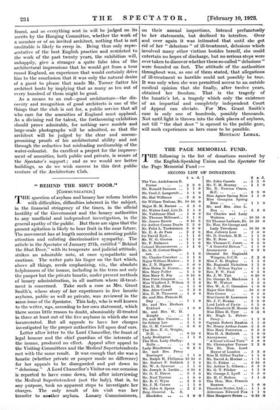T HE question of asylum and lunacy law reform bristles with
difficulties, difficulties inherent in the subject, in the financial stringency of the times, in the official hostility of the Government and the lunacy authorities to Any unofficial and independent investigation, in the general apathy of the public. But there are signs that the present agitation is likely to bear fruit in the near future. The movement has at length succeeded in arresting-public attention and enlisting discriminative sympathy. The article in the Spectator of January 27th, entitled " Behind the Shut Door," with its temperate and judicial attitude, strikes an admirable note, at once sympathetic and cautious. The writer puts .his finger on the fact which, above all things, needs emphasizing, viz., the absolute helplessness of the insane, including in the term not only the pauper but the private lunatic, under present methods of lunacy administration, in all matters - where ill-treat- inent is concerned. .Take such a case as Mrs. Grant Smith's, whose story of her 'experiences in five lunatic asylums, public as well as private, was reviewed in the same issue of the Spectator. This lady, who is well known to the writer, was, according to her own statement, which there seems little reason to doubt, abominably ill-treated in three at least out of the five asylums in which she was incarcerated. But all appeals to have her charges investigated by the proper authorities fell upon deaf ears.
Letter after letter to the Lord Chancellor,. the fount of legal honour and the chief guardian of the interests of the insane, produced no effect. .Appeal after appeal to the Visiting Committees and the Medical Superintendents met with the same result. It was enough that she was a lunatic (whether private or pauper made no difference) for her appeals to be disregarded and put -down to " delusion;,." A Lord Chancellor's Visitor on one occasion is reported to have come down, but after interviewing the Medical Superintendent (not the lady), that is, to any purpose, took no apparent steps to investigate her charges. The only result of his visit was her transfer to another asylum. Lunacy Commissioners, on their annual inspections, listened perfunctorily to her statements, but declined to interfere. Over and over again it was intimated that -until she got rid of her " delusions " of ill-treatment, delusions which involved many other victims _besides herself, she could' entertain no hopes of discharge, but no serious-steps were ever taken to discover•whether these so-called" delusions" were founded on fact. The attitude of the . authorities throughout was, as one of them -stated,- that allegations of ill-treatment so horrible could not possibly be true. It was only when she 'was-permitted access to an. outside medical opinion that she finally, after twelve years, obtained her freedom. That is the tragedy of the lunatic's lot, a tragedy which only the existence of an impartial and completely independent Court of Appeal can obviate. For Mrs. Grant Smith's case is only one of hundreds, possibly thousands. Not until light is thrown into the dark places of asylums, not till " the shut door " is opened to the public gaze, will such experiences as hers cease to be possible.
MONTAGIJ LOMAX.


































































 Previous page
Previous page